- and associated terms
o BUSINESS CONTINUITY
o DISASTER RECOVERY
o CRISIS MANAGEMENT
o COUNTRY RISK ANALYSIS
- Security Service companies (Globe Risk Ltd.)
- International Terrorism - re: Int'l Business
- Government Resources

| POLITICAL
RISK
- and associated terms o BUSINESS CONTINUITY o DISASTER RECOVERY o CRISIS MANAGEMENT o COUNTRY RISK ANALYSIS - Security Service companies (Globe Risk Ltd.) - International Terrorism - re: Int'l Business - Government Resources |
 |
see
also www.witiger.com/internationalbusiness/politicalrisk.htm
see
also www.witiger.com/internationalbusiness/politicalriskcontingencyplanning.htm
see
also www.witiger.com/internationalbusiness/geographicenvironment.htm
see
also www.witiger.com/internationalbusiness/personalrisk.htm
and also www.witiger.com/internationalbusiness/alanbell.htm
COVID Cathy Pacific planes temporarily moved to Australia
| INTRODUCTION | , | As said in the
intro to Alan
Bell's bio, successful International Business Management is based
on solving problems. If there were not a lot of problems, you
wouldn't need managers - but because there are lots of problems, you need
managers to analyze the problem, craft a solution, and monitor how the
solution is carried out.
Part of being a successful Int' Business Manager (especially after 911) is recognizing that risk and threat situations effect int'l business in many ways, and, these situations have to be dealt with, and "managed", or your company will be compromised and subsequently uncompetitive. WTGR |
| Why This UNIT is Important | "In the emerging
economies of Central and South America, Eastern Europe, the former
Soviet Union, Asia and Africa, new business opportunities are continuing
to present themselves on a daily basis as privatization takes hold, infrastructure
needs grow and restrictions on foreign trade are lowered. While the potential
rewards from doing business in these countries are tremendous, so are the
risks. The companies that expand into these new markets with the greatest
degree of success are those that do so cautiously and prudently, with the
understanding that they may face political and economic risks that
can cause unexpected and catastrophic losses. The possibility of
loss resulting from political events such as changes in government policy,
economic instability or acts of terrorism can be great."
James F. Quirk, a vice president of Marsh & McLennan |
| Why
This UNIT is Important
Mining
|
One of the biggest
sectors of the Canadian economy, that requires political risk assessment
and contingency planning is the mining sector.
Mining is big business in Canada. Many mining operations worldwide are operated or controlled by Canadian mining companies which got their origins in northern Ontario and B.S. decades ago. "Miners go where the minerals
are - and this often leads them to remote, undeveloped and frequently hostile
environments around the world."
|

 |
During
the 2nd week of May 2008, Richardson was interviewed by
John Downs of AM 640 news for a segment about the consequences
of a company involved in a foreign investment where terrorists benefit
from the investment.
MP3 here. http://people.senecac.on.ca/tim.richardson/audio/ audio2008May12interview640news.mp3 Several American victims of terrorist attacks in Israel are demanding millions in compensation from a Swiss bank. The Americans claim the Swiss bank should have known that sending money to Iran would result in terrorism being financed. |
| This
interview relates to political risk in the context that Canadian companies
are at risk when they do business in a country in which the political situation
involves activities that may compromise the ethics or integrity of the
Canadian firm and its customers and suppliers.
(Discussed also in the ethics.htm unit) Richardson explained there are a number of examples of situations where a business directly or indirectly does things which benefit terrorists or rogue states - a Canadian example cited by Richardson was the Quebec based helicopter parts manufacturer who sold technology and parts to a Chinese company that made the Z-10 "attack helicopters" for the Chinese army. Richardson noted that various human rights organizations such as www.oxfam.ca have researched how Chinese attack helicopters have been used in the Sudan by the Muslim backed government to attack and kill Christian refugees in western Sudan's Darfur region. "Canada has not authorized the export of combat aircraft to Colombia, where there are reports of aerial bombings of civilians as recent as 2004. Yet the Colombian Air Force is now acquiring Super Tucano aircraft from the Brazilian company Embraer, which are armed with two machine guns and are powered by engines from Pratt & Whitney Canada." oxfam |
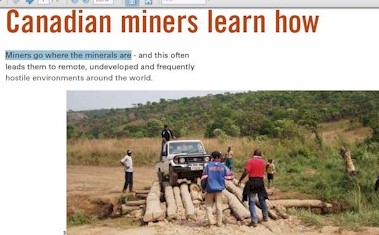 |
click to view larger |
| v | |
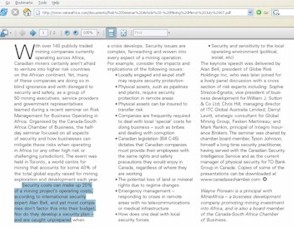 |
click to view larger, and read the points about the mining sector and security, and Alan Bell, regular guest speaker in C44 |
| main categories of risk | The
main categories of risk which effect international business
managers
CONFLICT / VIOLENCE - unstable ethnic, religious and military conflicts - including the types of threats within Political Risk
|
| Political Risk can be divided into several types of threats. | CONFLICT / VIOLENCE
"... persistent and deliberate refusal ...to honour obligations as set forth in a Contract.." |
| Political
Risk
Political violence |
(give us money for the XYZ Party or we will cut off the electrical power to your factory) |
| Political
Risk
Nationalization |
Nationalization
is typically when an extreme government takes action against foreigners
by using the military, or other power, to take ownership and control over
a business sector, or a collection of resources or real estate.
Typically this situation happens when foreign investors use their money to create some thing, such a develop a gold mine, or build an energy station, and the government decides to take over the facility by force or by some other action which leaves the foreigners without compensation. |
| Political Risk |
|
| Political Risk |
|
| what
are the
specific risks MEDICAL |
List of specific
medical risks and threats that can effect international businesses
|
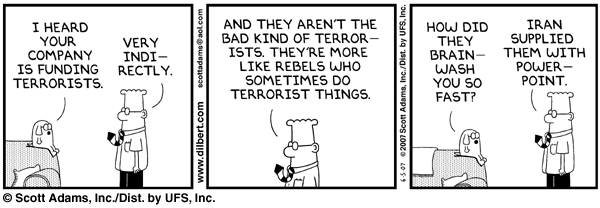
| what
are the
specific risks VIOLENCE |
List of specific
violent risks and threats
|
| what
are the
specific risks |
List of specific
risks from government problems or problems caused by gov't action
|
| VIOLENCE / PIRATES | List of specific
violent risks and threats - PIRATES
In early Feb 2009, student Lulu W. in MGTC44 at UTSC emailed some interesting comments about Pirates. Lulu said
|
| VIOLENCE / PIRATES | PIRATES - 2009
!!!
WTGR responds adding Pirates are active in several areas of the world In 2008 and into 2009 Pirates are active in the Singapore Straits, around the Indonesian islands, near the coast of Bangladesh, and off the coast of Somalia, and in the east part of the Pacific off Peru + irregular activity in the Caribbean (mostly targeting yachts which can then be used for drug smuggling).
- however that is rapidly changing as 2009 progresses. Somalians
who have been captured and prosecuted for piracy, have told the foreign
media that they committed these crimes out of desparation when they say
their fishing livelihod was being stolen by large international commercial
trawlers.
|
| VIOLENCE PIRATES | Defending against
pirates has become more aggressive, and the pirates in turn are using more
powerful weapons to attack.
Piracy off the coast of Somalia is getting worse
|
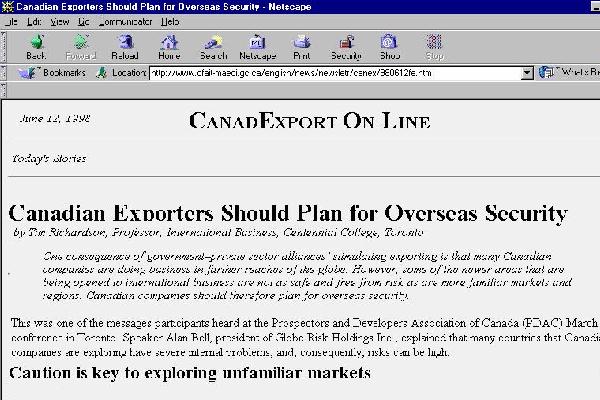
"One consequence of government–private sector alliances’ stimulating exporting is that many Canadian companies are doing business in farther reaches of the globe. However, some of the newer areas that are being opened to international business are not as safe and free from risk as are more familiar markets and regions. Canadian companies should therefore plan for overseas security."
"...these newer areas can
be rewarding for exporters, but Canadian companies need to exercise caution.
...a Contingency plan is one way to address risks"
WTGR
the article used to be at
http://www.dfait-maeci.gc.ca/english/news/newsletr/canex/980612fe.htm
- this link is no longer
working in 2005
.
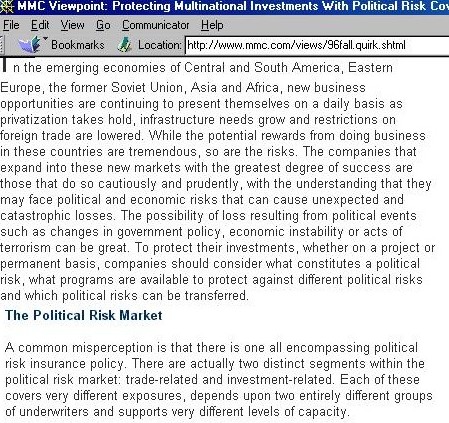 |
As more and more companies develop business in riskier areas around the world - providing risk insurance coverage of these companies is a growing business |
| KEY
POINTS |
The CanadExport article written by Prof. Richardson in 1998 was based on his work for, and with, a Canadian based, specialized security services company. This company, named Globe Risk, has some of the most distinguished people involved in security services consulting and contingency planning. The company, headed by Mr. Alan Bell, has its own web site at www.globerisk.com |
| Security
Services Companies contingency
Security
|
.
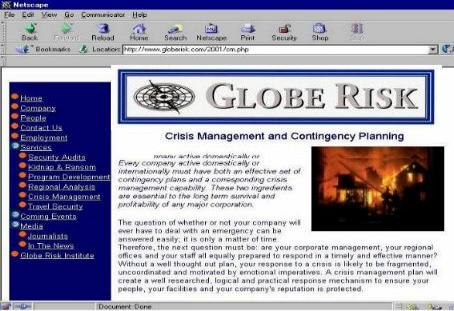
Globe Risk, "There are many questions when it comes to contingency planning and crisis management. Similar to an insurance policy, it prepares your company for any disasters it may encounter. Even more like an insurance policy, it can either be money wasted or well spent. When a crisis strikes your firm, it will be too late to find out. Then it will be up to legal teams representing damaged parties, injured employees and government regulators to determine your liabilities. " |
| Key Points | 9/11 provided
many examples of the challenges companies face when they did not have contingency
plans to handle the large scale impact of that terrorist attack.
Business Continuity is one of those terms that mean exactly what you think it means - the ability of keeping the business going after something bad happens Disaster Recovery is similar - you have a very bad situation that effects your company, and you carry out plans to recover, and keep going. One of the key things to keep in mind in International Business is that sooner or later bad things will happen to every company - life is like that - so successful companies are those that prepare for bad things and make sure they can recover, and then continue, which is good since un-prepared companies will not recover and the competitive environment will cause them to lose customers or halt production. WTGR |
| Business
continuity & Disaster Recovery |
Marsh and McLennan
is a large global company. Marsh had about 1,900 employees in the two towers
at "Ground Zero" Sept 11th - 295 were killed. While it might have been
reasonable for a company to have a plan if 5 or 10 employees were unavailable
due to an illness, nobody could have foreseen such a disaster like 9/11,
and, no company could have thought to prepare for what would happen when
295 head office employees are killed.
Bernard Mascarenhas (54) lived in Newmarket, Ont. and worked for Marsh Canada as chief information officer. On Sept 11th he was on the 97th floor of the north tower as part of a five-day business trip to New York. He was taking part in a conference call with other Marsh offices when the plane hit. Mascarenhas left his wife, Raynette, a son, Sven, and a daughter, Jaclyn.See Pat Moore's article at http://www.disaster-resource.com/cgi-bin/article_search.cgi?id='48' |
| Key Points | The business
continuity part of contingency planning refers to the ability of the company
to keep operating after a major disaster so as to be able to provide product
and service to the customers and keep earning income so it can continue
to pay its employees.
In a very competitive business environment, it can be expected that some companies will encounter challenges, unforeseen, and if they are able to deal with those challenges then they will survive, if not, the company will collapse and the customers will be picked up by a competitor. WTGR |
| COMMENT | Crisis Management
is a very large topic and in some university business school graduate courses
you can study this for weeks. The topic can be further subdivided into
human threats (robbery, hostage negotiation), technology based (like a
bad virus), political (change of government, revolution, terrorism), weather
and environmental, disease and illness etc.
WTGR |
| Crisis
Management |
What is a
Crisis?
"A crisis and a disaster are both bad for your business, but they are very different. A disaster is an event that results in great damage, difficulty, or death. A crisis is a situation that has reached an extremely difficult or dangerous point. A flood is a disaster. You should have prepared for that potential. Then you can deal with it according to your plan. A major product recall, such as Firestone has recently encountered with its SUV tires, is a crisis." "Crisis management means
having a plan in place, having identified who will do what, and having
practiced the plan for most conceivable events. Many of us think that we
are good enough managers that we can handle anything that comes up. We
think on our feet all the time and often all called upon to make quick
decisions on key issues. "
The reason for having a Crisis Plan is so that you do not have to take the time to "think" about what to do, you just quickly follow the steps of the plan which have been thought in advance. This allows response to be quick and effective and prevents the crisis becoming a disaster. |
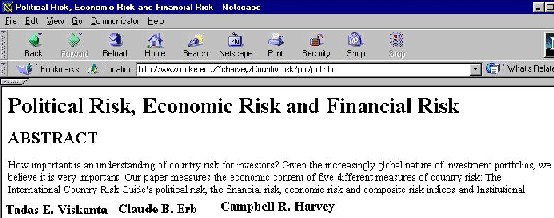
| COMMENT | The field of
Country Risk Analysis is usually something done for medium and large sized
companies were multiple regions of the world are involved - it is not something
we associate with small businesses involved in importing components or
small businesses exporting to a few clients.
We provide this information
not for the academic objectives of this course - but rather as an opportunity
to know about a category of international business which has become quite
specialized, and one in which you might be interested for career purposes.
|
| A Summary of
World-Wide Terrorism Events, Groups, and Terrorist Strategies and Tactics
www.emergency.com/cntrterr.htm Presently, many medium and
large sized companies involved in B2C and also B2B situations, recognize
that many of the "safe" areas in the world are being saturated with business,
and the only new opportunities lie in regions of risk - therefore in the
field of international business there is (in some sectors) an increased
interest in knowing more details about the regions of risk and what possibilities
there are to do business there - this is particularly true for resource
extraction companies and companies selling branded consumer items and services.
|
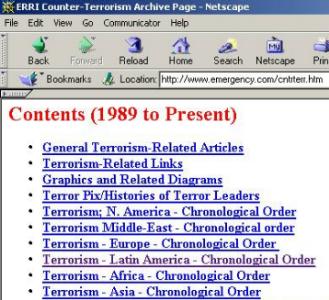 |
| KEY
POINTS |
When we discussed
int'l terrorism in international business classes in 2000, 1999 and earlier,
there was not the same interest and attention to details as we have had
since Sept 11th, 2001.
WTGR |
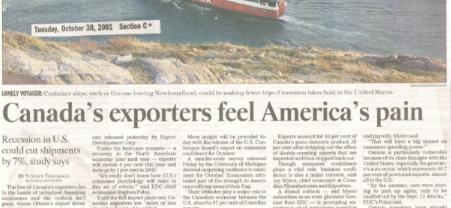
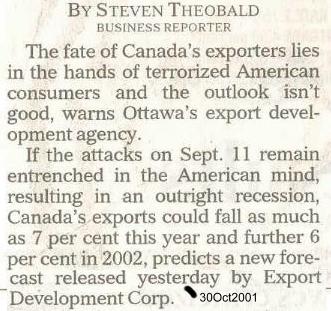 |
This article,
which appeared in the Toronto Star Oct 30th, makes some good points about
the effects of Sept 11th on shipping and business between Canada and the
U.S.
Canadians in international business should be particularly concerned because of the large amount of exports Canada has to the United States. |
| Canadian
government info Canadian
|
As explained by the author, Dr. Davidson Smith "The term "Single Issue Terrorism" is broadly accepted as extremist militancy on the part of groups or individuals protesting a perceived grievance or wrong usually attributed to governmental action or inaction" Here was the entire list
of commentaries in the series
|
| KEY
POINTS |
The reason we
mention this topic on the CSIS site is because knowing about such things
can assist companies involved in international business. If the activities
of certain business are perceived as supporting some government action
in a foreign country, which the local population are against - it is possible
that local hostility could be extended to the foreign company, as well
as the government.
- examples include the circumstances of Talisman which operated in the Sudan. WTGR |
| Political
Risk
Political violence CASE STUDY
|
A Reuters story,
carried on CNN Sept 22, 2005, reported that "more than 100 armed militants
stormed a U.S.-operated oil production platform in Nigeria and forced it
to close on Thursday [Sept 22, 2005] in response to the arrest of an ethnic
militia leader on treason charges."
Reuters said "Armed with
assault rifles, the fighters invaded the Idama platform operated by Chevron
www.chevron.comin the southern Niger
Delta, escalating a simmering political crisis in the world's eighth largest
oil exporter. "Eight boats, each carrying 15 armed people occupied the
Idama flow station. Six government security forces had their weapons taken
from them," a source close to Chevron said."
Interestingly, the BBC reported much more detail on the situation than American controlled CNN. The BBC story explained that there has been a lot tension in the region between the foreign owned oil companies and the Nigerians who work for those companies and the Nigerians living in villages effected by the oil operations. The BBC noted in 3rd week
of September (2005)
This would be considered a good example of the Integrative Approach as opposed to the Defensive Approach. If Chevron had adopted a Defensive Approach they would have hired more security to protect the oil rig platforms. In this case, an Integrative Approach seems to go to the root of the problem. The BBC added "Nigeria is Africa's largest oil-producer but protests are common in oil-producing regions by local communities, demanding that more of the oil wealth is used for their benefit. Locals often kidnap workers and demand ransom money from oil companies." |
| Political
Risk
Political violence CASE STUDY
|
"Nigeria is
Africa's leading oil producer and ranks among the top 10 oil producing
countries in the world. Oil is the country's main natural resource and
accounts for 80% of its revenue and 95% of its export earnings." from www.shell.com
Royal Dutch Shell www.shell.com considered the threat to operations (Sept 2005) and looked at what happened to the American company, and evacuated non-essential staff from one of its platforms. "a senior industry source said the 70,000 barrels-a-day output from that facility would be maintained by a skeleton staff. Oil prices are near record highs due to hurricane damage in the southern United States. Any disruption to exports from Nigeria, the fifth largest supplier of the U.S., would make the situation more precarious." |
| Political
Risk
Political violence GENOCIDE SUDAN |
In the world
today (2006) there are some situations of political risk that are so extreme
they could be termed genocide - meaning that one ethnic group is trying
to kill everyone in another group because of differences in language, cultural
practices or religion.
The Eight Stages of Genocide Originally written in 1998
by Prof. Gregory H. Stanton, http://www.genocidewatch.org/8stages.htm,
1. Classification-This
is the separation of peoples into different categories such as German and
Jew or Hutu and Tutsi.
In 2004, Stanton ranked Sudan at stage 7. |
| Political
Risk
Political violence GENOCIDE SUDAN |
Why do we mention
Genocide in MGTC44 - because the actions or various international businesses
have contributed to the conflict in the Sudan and it is something that
responsible citizens of the world should not accept.
The Sudan is an example of how cultural animosities are exploited for foreign multinationals in the pursuit of natural resources. International Business is not studied in a theoretical vacuum, - real things happen in the world of international business that can be observed and reported in the media and some of those "real things" are very bad. Students should be aware of these situations, read the newspaper, and make informed choices. WTGR |
|
|
CONTACT IMAIN PAGE I NEWS GALLERY I E-BIZ SHORTCUTS I INT'L BIZ SHORTCUTS I MKTG&BUSINESS SHORTCUTS I TEACHING SCHEDULE |
| . | |
| MISTAKES I TEXTS USED I IMAGES I RANK I DISCLAIMERI STUDENT CONTRIBUTORSI FORMER STUDENTS I | |
| . |